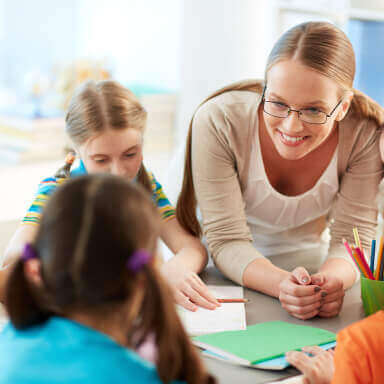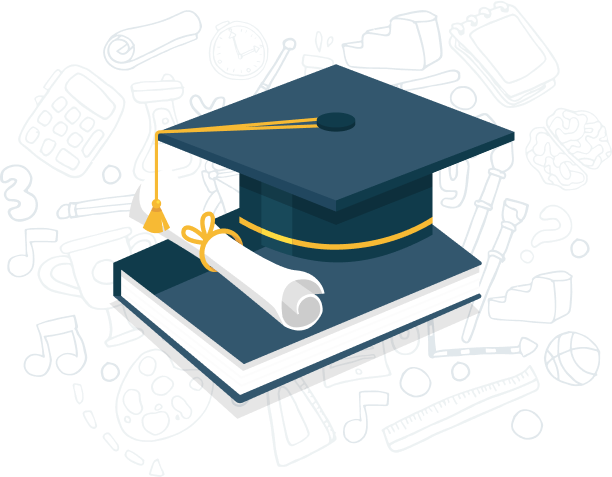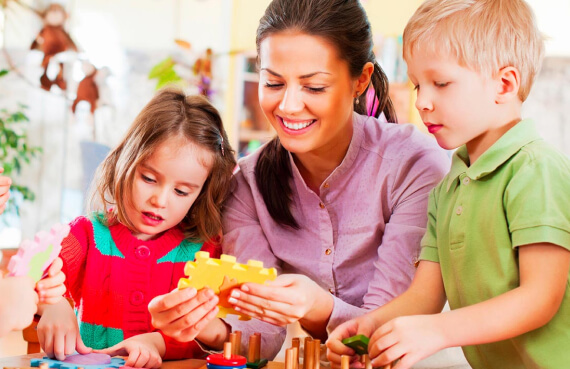Benefits of Montessori
The Montessori method of education recognizes that children learn in different ways and look at each child as an unique individual. Children are free to learn at their own pace and advance through the curriculum as they become ready where the teachers look to guide this learning through the Individual planning for each child. Children are encouraged to care for one’s self through practical life activities and help others in the classroom as they master these skills. Montessori classrooms also become a close caring community as children of different ages (e.g. 2 1/5 to 6) work together at difference levels in the classroom at the same time. Children have the opportunity to work independently, be participants or observe the learning without interrupting the work of another child – understanding the importance of respect at a very young age. Montessori students are encouraged to share their learning or tasks they have mastered with the younger children in the classroom which creates empathy, confidence and a harmonious caring environment. As children become willing helpers and readily share their knowledge, it helps them to revisit their recently mastered activities with confidence and internalise / advance in their learning.
The Montessori classroom encourages children to maintain respect, peace and harmony as they work together. Children are taught to complete their work cycles by putting their work back in the shelves where they learn respect for both materials and their peers. Children and Teachers in Montessori classrooms use quiet voices, slow movement – walking feet, to ensure that children become aware of their environment and experience peace within.
Creating solid foundation for lifelong successes
Caring and challenging educational environment
The Montessori Method of education, developed by Dr. Maria Montessori, is a child-centered educational approach based on scientific observations of children from birth to adulthood. Dr. Montessori’s Method of education has been time tested, with over 100 years of success in diverse cultures throughout the world. It is a view of the child as one who is naturally eager for knowledge and capable of initiating learning in a supportive, thoughtfully prepared learning environment. It is an approach that values the human spirit and the development of the whole child—physical, social, emotional, and cognitive.
Every material in a Montessori Classroom will support an aspect of child development creating a match between the child’s natural interests and the activities.
At Trillium Montessori School children will be encouraged to explore through self-directed activity, hands-on learning and collaborative play. Children will be encouraged to work individually, at their own pace and in groups as they begin discover and explore the knowledge of the world, to reach their maximum potential and build a foundation for life long learning.
What is special about centre
Vision & Mission Statements
-

Our Vision
Our vision is to nurture and empower children to reach their full potential by planting the seeds to create a passion for life-long learning.
-

Our Mission
Our mission is to provide a prepared caring environment for children from 6 months to 6 years that would enhance their natural curiosity towards collaborative learning and self-discovery guided by the Montessori Method of Teaching.
-

We Offer
At Trillium Montessori School, we offer a caring and challenging educational environment for infants, toddlers and pre-school children up to 6 years of age.
Prepare your child for school readiness
Feel The Difference
What gives our schools the quality you feel the moment you enter are the “pillars” of belief that support them. There are six core beliefs on which everything centers at our schools.
-
Experiential Learning
We help children connect with their surroundings in new ways, so they discover what is meaningful to them in the moment and in the future.
-
Community
A child’s educational success in large part depends on families, educators, peers and relevant members of the community.
-
Collaboration
Sharing new experiences and solving problems with others leads to a greater sense of connectedness – as well as meaningful learning experiences.
-
Proven Models
Several important learning models have been developed by educators around the world. The human connection must be a key component of learning.
Learning Is Child-Centered
Montessori children enjoy a curriculum that is thoughtfully designed to support individual learning. It allows children to explore and learn at their own pace and promotes the child’s natural desire to learn. It is an approach that values the development of the whole child – physical, social, cognitive and emotional.

Learning and Teaching Methodology
Dr. Montessori’s Method of education has been time tested, with over 100 years of success in diverse cultures throughout the world. It is a view of the child as one who is naturally eager for knowledge and capable of initiating learning in a supportive, thoughtfully prepared learning environment. It is an approach that values the human spirit and the development of the whole child—physical, social, emotional, and cognitive. Every material in a Montessori Classroom will support an aspect of child development creating a match between the child’s natural interests and the activities.

The Montessori curriculum focuses on the key developmental stages of a child from birth to the age of six years. Dr Maria Montessori believed that during this time, children construct their individuality through 2 stages of development – the unconscious and conscious stage. Children under the age of 3, have the ability to absorb information without making a conscious effort i.e. through observation and repeating what they see – “impressions do not merely enter a child’s mind; they form it” Dr Maria Montessori. From 3 – 6 years of age, children move into the more conscious stage of development whilst continuing to absorb information more easily. They will also seek information consciously in order to expand their pre-existing knowledge through experience. At this stage, they will often want to choose activities for themselves and will try to complete these tasks independently.
Dr Maria Montessori talked about the absorbent mind of children and their ability to learn effortlessly by soaking in large amounts of information.
Focuses on Key Developmental Stages
The Montessori curriculum focuses on the key developmental stages of a child from birth to the age of six years. Dr Maria Montessori believed that during this time, children construct their individuality through 2 stages of development – the unconscious and conscious stage. Children under the age of 3, have the ability to absorb information without making a conscious effort i.e. through observation and repeating what they see – “impressions do not merely enter a child’s mind; they form it” Dr Maria Montessori. From 3 – 6 years of age, children move into the more conscious stage of development whilst continuing to absorb information more easily. They will also seek information consciously in order to expand their pre-existing knowledge through experience. At this stage, they will often want to choose activities for themselves and will try to complete these tasks independently.
Dr Maria Montessori talked about the absorbent mind of children and their ability to learn effortlessly by soaking in large amounts of information.
Learning is Child-Centered
Montessori children enjoy a curriculum that is thoughtfully designed to support individual learning. It allows children to explore and learn at their own pace and promotes the child’s natural desire to learn. It is an approach that values the development of the whole child – physical, social, cognitive and emotional.
Sense of order in the Montessori Classroom
15

Years of experience
142

Students Enrolled
24

Qualified Teachers
12

Total Groups
Get to know our staff
Dedicated Teachers & Staff
Our staff are dedicated to enhancing the lives of children with diverse special needs by providing evaluations and other services for children to achieve full and independent lives.
Professional and graduated
Our Staff are Guided by the Principles of
Above and beyond our already stringent code of ethics and guidelines for continuing education, our professional staff are guided by the principles and ethical codes of the following clinical and educational organizations:
-
American Speech & Hearing Association (ASHA)
-
Bell Academy for Listening and Spoken Language
-
American Physical Therapy Association (APTA)
-
Audiology Foundation of America
-
American Board of Audiology

Why choose us
We provide a warm and exciting environment where children can play and learn. The activities we offer encourage creativity whilst enhancing children’s skills in many areas. We celebrate multiculturalism and incorporate Te reo Māori into our daily teaching, creating an awareness of how differences can be a part of our natural world. We encourage children to be global citizens by teaching them about sustainability, the importance of charity and how to appreciate and learn from other cultures and values.
Gardening
Sport
Art
Outdoor
Math
Literacy
Our
Curriculum
Gardening
The Toddler and Preschool Groups have a garden in their outdoor space. Each spring, the children and teachers contribute and create beautiful and educational container/raised bed gardens.
Sport
Children need to develop large motor and small motor skills and cardiovascular endurance. Extensive physical activity is also needed to address a growing problem of obesity in American children.
Art
Kids will love designing and creating puppets and collages, constructing musical instruments and flower bouquets, and painting, gluing, and crafting to their hearts’ content!
Outdoor
Our children benefit from a variety of outdoor play spaces. In addition to our playground, they experience the natural wonders of the forest, the big field, our raised gardens and nature walks.
Math
A preschool math curriculum should be taught using preschool lessons including interactive activities, learning games, printable worksheets, assessments, and reinforcement.
Literacy
A systematic and integrated literacy program promote language development preschool children. The program uses systematic, direct instruction built around a series of weekly books in the classroom.







